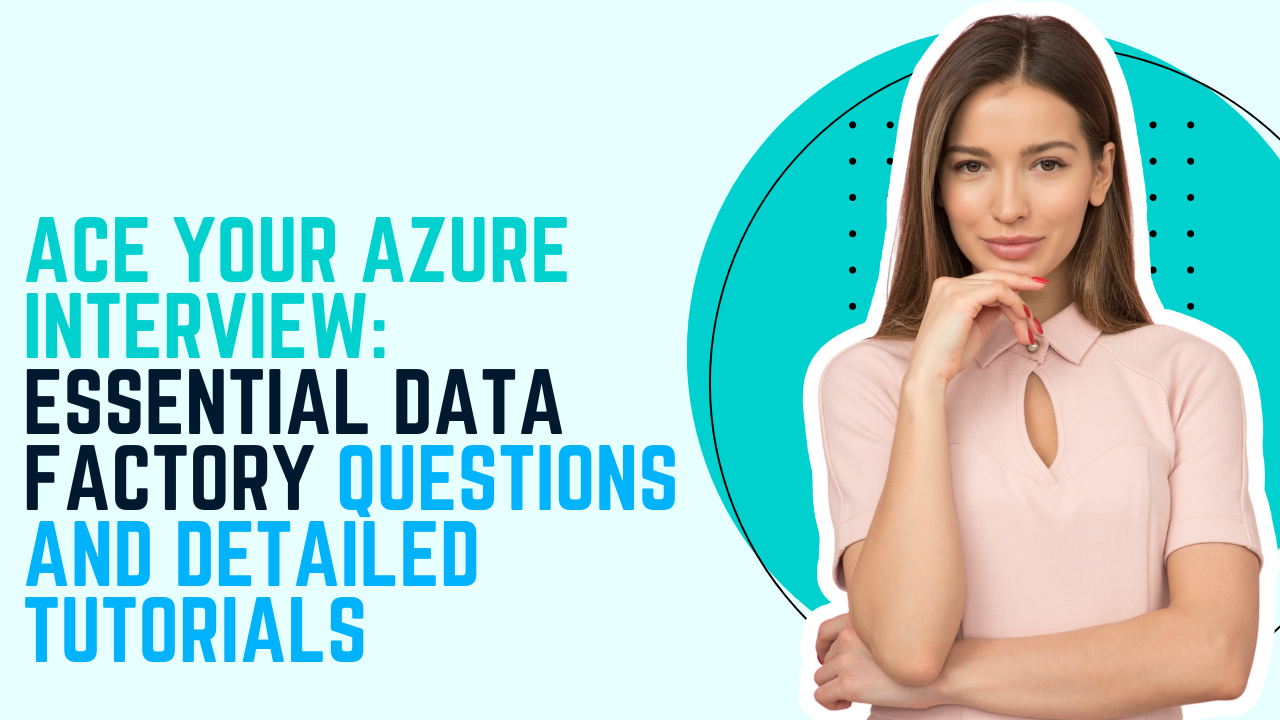Are you gearing up for an Azure interview and want to dive deep into Azure Data Factory? To help you ace your upcoming interview, this article covers essential Azure Data Factory interview questions and provides detailed tutorials to boost your preparation. We’ll delve into common topics, practical exercises, and provide useful tips to ensure you’re ready to tackle any challenge that comes your way.
Understanding Azure Data Factory
Azure Data Factory (ADF) is a cloud-based data integration service that allows you to create, schedule, and orchestrate data workflows. It enables you to move data between various data sources and process it efficiently. Whether you’re working on ETL (Extract, Transform, Load) operations or data integration projects, understanding the fundamentals of ADF is crucial. For a more comprehensive list of Azure Data Factory interview questions.
Core Concepts of Azure Data Factory
To excel in your Azure interview, it’s essential to grasp the core concepts of Azure Data Factory. These include:
-
Pipelines: The core unit of work in ADF, representing a collection of activities.
-
Activities: Individual tasks that execute operations like data movement or transformation.
-
Datasets: Definitions of data structures used in pipelines.
-
Linked Services: Connections to data sources or sinks.
Understanding these components and how they interrelate will help you answer questions about ADF architecture and functionality.
Common Azure Data Factory Interview Questions
When preparing for an Azure interview, focus on these typical Azure Data Factory interview questions:
1. What is Azure Data Factory and what are its main components?
Azure Data Factory is a cloud-based data integration service that facilitates the movement and transformation of data. Its main components include pipelines, activities, datasets, and linked services.
2. How do you create and manage pipelines in Azure Data Factory?
Pipelines are created in the ADF portal, where you define activities and their sequence. You can manage pipelines by monitoring their execution, setting up triggers, and handling errors.
3. What are the different types of activities in Azure Data Factory?
ADF offers several activities, including data movement activities (e.g., Copy Activity), data transformation activities (e.g., Data Flow Activity), and control activities (e.g., If Condition, For Each).
4. How do you handle errors and debugging in Azure Data Factory?
ADF provides monitoring and logging features to track pipeline execution. You can use these features to debug issues and handle errors by setting up retry policies and using error handling activities.
Advanced Azure Data Factory Topics
For a thorough understanding and to be prepared for advanced questions, you should also delve into the following topics:
1. Integration Runtimes
Integration Runtimes (IR) are critical for data movement and transformation. They can be Azure-hosted or self-hosted, depending on your needs. Understanding their configurations and use cases is vital.
2. Data Flows
Data Flows in ADF allow for more complex transformations and data manipulations. They offer a visual interface to design data transformations, making them a powerful tool for data integration.
3. Custom Activities and Azure Functions
Custom activities enable you to execute custom code in your pipelines. Azure Functions can be used to run small pieces of code triggered by your ADF workflows.
Tips for Acing Your Azure Data Factory Interview
-
Understand the Architecture: Knowing how different ADF components fit together will help you answer questions about design and implementation.
-
Practice Common Scenarios: Work on real-life scenarios involving data integration, transformation, and error handling.
-
Stay Updated: Azure services evolve rapidly, so ensure you’re familiar with the latest features and updates.
For further study, explore this comprehensive guide on Azure interview questions.
Conclusion
Acing your Azure Data Factory interview involves a deep understanding of core concepts, common questions, and advanced topics. By preparing with the essential questions and tutorials provided, you’ll be well-equipped to handle your interview with confidence. Whether you’re just starting with Azure or looking to brush up on your skills, mastering these areas will help you achieve the ultimate success in your Azure journey.
FAQ
1. What is Azure Data Factory?
Azure Data Factory is a cloud-based data integration service from Microsoft Azure that allows you to create, schedule, and orchestrate data workflows. It supports moving and transforming data from various sources.
2. What are the key components of Azure Data Factory?
The key components include pipelines, activities, datasets, and linked services. Pipelines are collections of activities, while linked services connect to data sources.
3. How do you create a pipeline in Azure Data Factory?
Pipelines are created through the Azure Data Factory portal by defining activities and their execution sequence. You can use the graphical interface to design and configure your pipeline.
4. What types of activities are available in Azure Data Factory?
ADF supports various activities, including data movement activities (e.g., Copy Activity), data transformation activities (e.g., Data Flow Activity), and control activities (e.g., If Condition, For Each).
5. How can you handle errors in Azure Data Factory?
Error handling can be managed through monitoring and logging features. You can set up retry policies, use error handling activities, and check pipeline run history for troubleshooting.
6. What is an Integration Runtime in Azure Data Factory?
An Integration Runtime (IR) is a compute infrastructure used by Azure Data Factory to move and transform data. It can be Azure-hosted or self-hosted depending on your needs.
7. What are Data Flows in Azure Data Factory?
Data Flows are visual tools in ADF that allow you to design and execute complex data transformations and manipulations within your pipelines.
8. How can custom activities and Azure Functions be used in Azure Data Factory?
Custom activities let you run custom code within your pipelines, and Azure Functions can be used to execute small pieces of code in response to pipeline triggers.




